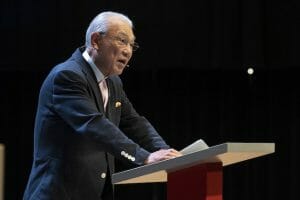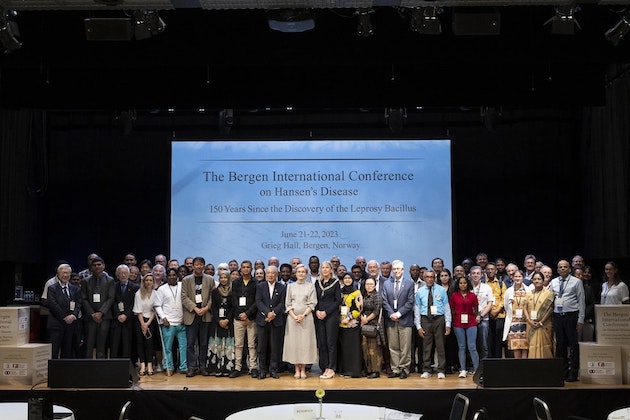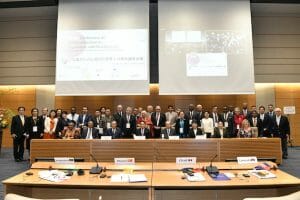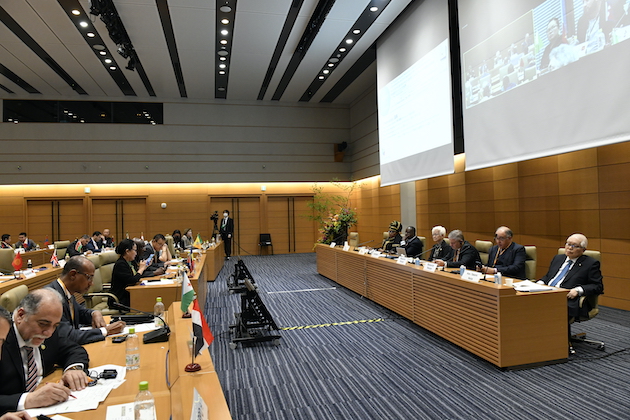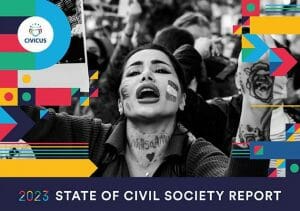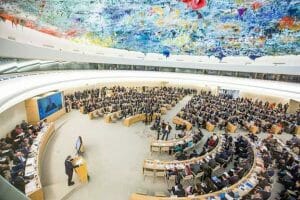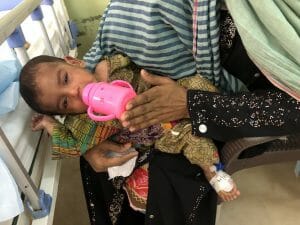

Experts encourage parents to vaccinate their children against typhoid to ensure that the child has access to clean drinking water. Credit: Zofeen Ebrahim/IPS
By Zofeen Ebrahim
KARACHI, Jul 6 2023 (IPS)
The first thing you notice about eight-month-old Manahil Zeeshan is how tiny she looks on the adult-size hospital bed at the government-run Sindh Institute of Child Health and Neonatology (SICHN) in Korangi, a neighbourhood in Karachi.
Her right foot is taped with a cannula, and she whimpers incessantly. “I have been in and out of the hospital for the last seven days,” said Uzma Mohammad, Zeeshan’s mom, with worry lines on her forehead. “High fever that refused to come down, severe cough for days and breathlessness,” were some of the symptoms Mohammad described. She was convinced someone had “put a spell” on her daughter.
The doctors, however, suspected she had typhoid.
Salmonella Typhi bacteria cause typhoid fever, and Salmonella Paratyphi bacteria cause paratyphoid fever. According to the US-based public health agency, Centers for Disease Control and Prevention, along with a fever that can be as high as 103 to 104°F (39 to 40°C), the sick person can have weakness, stomach pain, headache, diarrhoea or constipation, cough, and loss of appetite. Some people have a rash of flat, rose-coloured spots. Internal bleeding and death can occur but are rare. It affects between 11 and 20 million people each year, leading to 128,000 to 161,000 deaths, according to the World Health Organization (WHO). The highest fatality rates are reported in children under four years of age.
While Zeeshan’s blood culture report had yet to come to ascertain the cause of her sickness, she needed urgent medical care, said Dr Shabita Bai, who had admitted her.
“We could not wait for five days for the blood culture report as she was not doing well. And because she had already been given an antibiotic (a medicine used to kill bacteria) from outside, our chances of finding if the baby had typhoid for sure were slim, and we had to rely on the history,” justified Bai.
Decisions had to be made. Based on her condition, symptoms, and clinical diagnosis, the baby was given Ceftriaxone, an intravenous antibiotic, but she showed no improvement. The doctors then administered the stronger Meropeneme intravenously, a last-resort antibiotic.
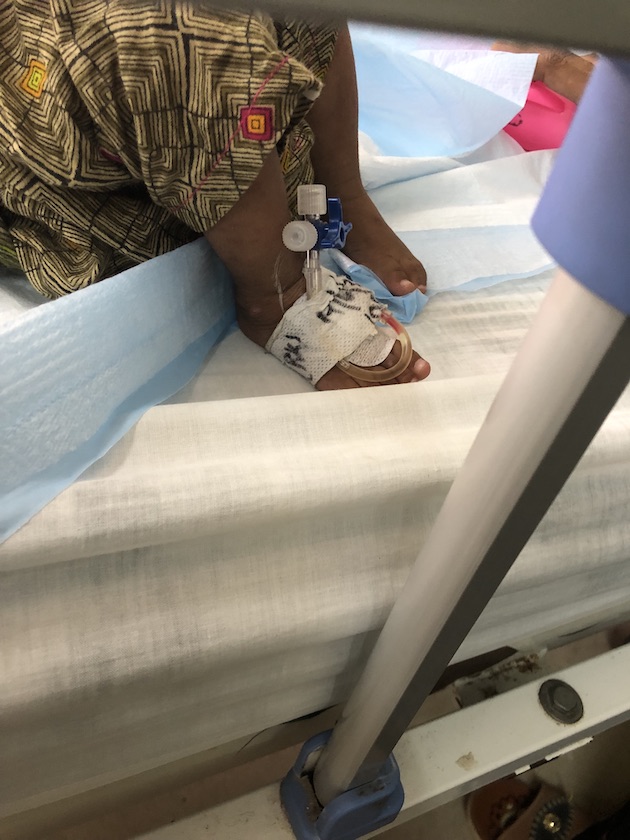
Manahil Zeeshan’s foot has a drip in an effort to bring her temperature down and fight suspected typhoid. Credit: Zofeen Ebrahim/IPS
Battling the Superbug
But even if she had typhoid, the bacteria in her body had taken on the form of a superbug — the extensively drug-resistant (XDR) typhoid and the current antimicrobials had become ineffective, said paediatrician Dr Jamal Raza, the executive director of the SICHN.
According to a Lancet study published in 2022, multidrug-resistant (MDR) typhoid has been seen in Pakistan, while typhoid bacteria resistant to the widely-used antibiotic azithromycin have been found in Bangladesh, Nepal and India. “Our analysis revealed a declining trend of MDR typhoid in south Asia, except for Pakistan, where XDR S Typhi emerged in 2016 and rapidly replaced less-resistant strains,” stated the study, which researchers claim is the largest ever examination of the S.Typhi bacterium.
The reason why antibiotics are losing their punch against some types of bacteria, said Raza, was the “indiscriminate use of antibiotics” that health practitioners prescribe to provide immediate relief. Another big problem was self-medication by people. “I know people often use an old prescription by a doctor to get the same medicine if they feel they have the same symptoms, thinking they do not need to visit the doctor.”
But he pointed out viruses, which are also small germs like bacteria, are causing bacteria-like infections, like a cold or the flu.
“Taking an antibiotic for the latter does not treat the disease; it only leads to antibiotic resistance,” said Raza.
A study conducted by researchers from three medical institutions, namely, the Aga Khan University (AKU) in Karachi, the Armed Forces Institute of Pathology (AFIP) in Rawalpindi, and the Shaukat Khanum Memorial Cancer Hospital & Research Center (SKH) in Lahore in 2018, found indiscriminate use of antibiotics to be causing new drug-resistant “superbugs.”
It found a high prevalence of multidrug and fluoroquinolone resistance for both S.Typhi and S. Paratyphi strains of typhoid bacteria. From 20% in 1992, the resistance was found to have increased to around 50% in 2015. The stubborn bacteria were resistant to antibiotics like ampicillin, chloramphenicol (and co-trimoxazole), as well as fluoroquinolone (ciprofloxacin and/or ofloxacin).
“The situation is quite grim,” said Dr Mashal Khan, chairperson of the government-run paediatric medicine department at Karachi’s National Institute of Child Health, referring to the increase in the number of children developing resistance to typhoid drugs. His worry is not that the bacteria has spread; his concern is the bacteria has mutated and become resistant to the drug.
“We’re running out of new antibiotics to treat bacterial infections; Meropeneme is the last one, and a very expensive one too,” he said resignedly, adding: “Although the development of newer antibiotics is the need of the day, I must emphasise the rational use of the ones being used is more urgent.”
Developing new drugs is challenging, and antibiotics more so, as the science is tricky.
“Antibiotics are not the most lucrative drugs to develop for pharmaceuticals as their utility is limited in the future due to the bacteria developing the ability to resist them,” said Infectious Diseases specialist and epidemiologist Dr Faisal Mahmood at the Aga Khan University Hospital in Karachi. “A lot of money goes into developing new drugs, and since most of the funding is from the global north, they prefer to work on infections which concern them directly. Typhoid is unfortunately endemic in the low and middle-income countries in the South, which have poorer water quality and have warmer, more humid climates.”
And that is why the only sure-shot way of reducing the disease burden of typhoid is to vaccinate the children.
In 2019, Pakistan became the first country to get the World Health Organization (WHO)-recommended single-dose typhoid conjugate vaccine (TCV) injected intramuscularly, added to its routine immunisation (RI) regime. This is given to babies at nine months, alongside measles-rubella vaccinations, without impacting either vaccine.
“Childhood vaccination complemented with clean drinking water and improved hygiene practices is the much more cost-effective way of eradicating typhoid than pumping antibiotics in a child,” said Raza. Meropenem costs as much as Rs. 30,000 (USD 105) for a 10-day course, and if hospitalisation is included, it can go up to Rs 100,000 ($349), said the doctor. Being in a government hospital, Zeeshan is treated free of cost.
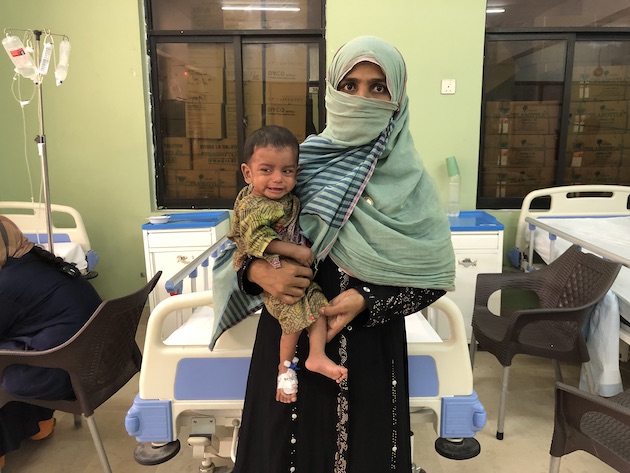
Eight-month-old Manahil Zeeshan is treated for typhoid at the government-run Sindh Institute of Child Health and Neonatology (SICHN) in Korangi, a neighbourhood in Karachi. Credit: Zofeen Ebrahim/IPS
Typhoid Vaccine Launch Hits a Snag as Covid-19 Surfaces
The 2019 TCV campaign was first launched in the two cities of Sindh – Karachi and Hyderabad (children up to 15 years of age were also given a shot), which reported the highest number of typhoid cases among children. There was a pause when Covid-19 hit the world. But by 2022, TCV had been launched across Pakistan, and 35.5 million children were vaccinated, after which it was added to the government-run Expanded Programme on Immunisation (EPI) programme.
“Many parents do not know that the TCV is a more effective vaccine but only available at government vaccination centres, and not at private clinics and hospitals as Gavi has only given it to the government of Pakistan,” said paediatrician Dr D.S. Akram.
“There is another typhoid vaccine available in the private sector (typhoid polysaccharide vaccine), but it can only be given to children over two years of age, and it needs boosters every three years. My advice to parents is to vaccinate their kids against typhoid bacteria at nine months,” she said.
But it is still a drop in the ocean, and the fight against typhoid and other childhood diseases continues. The WHO places Pakistan among the ten countries that account for almost two-thirds of the world’s unimmunised children.
When Covid-19 hit the country’s already crumbling health system, it also brought the country’s immunisation programme to a halt too. An estimated 1.5 million children across Pakistan missed out on basic vaccines from March to May 2020, according to Gavi.
For Pakistan, which already has low immunisation coverage (the percentage of fully immunised children aged 12-23 months is just 66%), it meant a further dip in coverage which led to an unprecedented rise in the number of zero-dose children (those that have not received any routine vaccine). Add to these were the almost 19,000 new births every day. But when the lockdown eased and vaccinators returned to work, there was less demand for vaccination, having been replaced by fear of the new virus.
While Pakistan has yet to reach the optimal immunisation coverage of 90%, during Covid-19, Pakistan’s EPI received plaudits internationally for taking both vaccine coverage and the number of zero-dose children close to pre-pandemic levels in 2021. “What Pakistan achieved needs to be celebrated. In fact, Pakistan and Chad are used as examples internationally of how to get it right in an emergency,” said Huma Khawar, an immunisation and child health advocate working closely with EPI.
“Despite a year’s delay due to Covid-19, which was unforeseen, I think it is the best thing that the government has done for its country’s children,” said Khawar. She credited the RI programme that bounced back to the pre-pandemic level in 2021.
Clean water, Good Hygiene Key to Preventing typhoid
While immunisation can protect children from getting infected, clean drinking water and improved hygiene practices can reduce the risk of catching the disease to a great extent.
“Vaccines provide immunity when there is exposure to the bacteria,” agreed Dr Jai Das, assistant director at the Institute for Global Health and Development at the Aga Khan University and one of the co-authors of the 2018 report on typhoid, but emphasised the need for improved water and sanitation, a situation that continues to remain dismal and compromised in Pakistan.
The same study not only found a strong correlation between water and sanitation but to literacy levels as well. In addition, it stressed improving the country’s food safety protocols and implementing regulations.
While Mohammad believes that her daughter is under a curse, one reason could be that the unpasteurised cow’s milk she gives her daughter may not be properly boiled at home. “I was unable to breastfeed her,” she said. Further, she confessed to diluting it with unboiled tap water to make it last longer.
Doctors say giving Pakistani babies a lease of life is simple and costs nothing. “Exclusive breastfeeding up to at least six months of age (right now it is only 43%), attaining 90% coverage of RI across Pakistan and improving water and sanitation quality,” according to Dr Akram.
Bacteria Don’t Respect Geographic Borders
The XDR typhoid bacteria propagating in Pakistan has crossed borders and reached as far as the UK, Canada and the US. Earlier this year, a team of Pakistani and US researchers published their findings in the American Journal of Tropical Medicine and Hygiene, stating that with numerous typhoid bacteria variants circulating in Pakistan have also been identified in Southeast Asia and Eastern and Southern Africa and have been introduced into the United Kingdom, Canada, and the United States by travellers.
The Lancet study said strains from South Asia had spread 200 times to other countries since 1990. When these superbugs grow and spread, they can cause infections that are hard to treat. Sometimes they can even spread the resistance to other bacteria they meet.
The future looks frightening. While the need for improving water and sanitation cannot be overemphasised, along with the need for vaccinating children, newer and stronger antibiotics need to be developed and fast as typhoid may surface in deadlier ways than now since very few antibiotics remain effective against the bacteria.
Note: This story was supported by the Sabin Vaccine Institute and Internews
IPS UN Bureau Report
Excerpt:
Childhood vaccination, complemented with clean drinking water and improved hygiene practices, are the key to eradication of typhoid XDR, not indiscriminate use of antibiotics, say Pakistan health experts. Source

